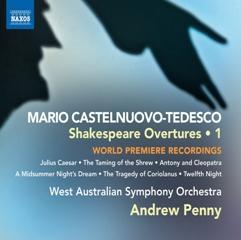Mario Castelnuovo-Tedesco - Shakespeare Overtures • 1 (2010)
Mario Castelnuovo-Tedesco - Shakespeare Overtures • 1 (2010)

1 Giulio Cesare (Julius Caesar), Op. 78 11:19 2 La Bisbetica Domata (The Taming Of The Shrew), Op. 61 9:22 3 Antony And Cleopatra, Op. 134 17:49 4 A Midsummer Night's Dream, Op. 108 6:43 5 The Tragedy Of Coriolanus, Op. 135 9:14 6 La Dodicesima Notte (Twelfth Night), Op. 73 10:40 Cello [Soloist] – Michael Goldschlager Concertmaster, Violin [Soloist] – Ashley Arbuckle Cor Anglais [Soloist] – Jay Harrison Oboe [Soloist] – Joel Marangella West Australian Symphony Orchestra Conductor – Andrew Penny
The Naxos series of Italian Classics has unearthed some real gems, not least the First and Second symphonies of Alfredo Casella. His compatriot, Mario Castelnuovo-Tedesco, is also due for reappraisal, so in that respect these overtures are most welcome. That said, the composer’s Hollywood years – he wrote the music for around 200 films – made it more difficult to pursue a career as a ‘serious’ artist. Fellow émigré Erich Wolfgang Korngold faced much the same problem, but he seems to have been as successful in the concert hall as he was on the silver screen.
Doing the honours in this first volume of overtures – the second is available on 8.572501 – are Andrew Penny and the West Australian Symphony Orchestra. The band may be unfamiliar, but the British-born conductor is not; indeed, his Naxos recordings of Malcolm Arnold symphonies and British light music have been very well received. Curiously, this ‘world premiere’ collection was recorded 16 years ago, and I have to say the overture to Julius Caesar doesn’t augur well. This is drab stuff, made even more so by a close, rather airless acoustic. And if that wasn’t enough, the strings sound scrawny, the brass poorly blended.
Yes, The Taming of the Shrew – which sounds good enough to eat in its Italian translation – promises to be light rather than lugubrious, but within seconds it’s clear this isn’t much better. A quick comparison with other Shakespeare-inspired works, such as Korngold’s A Midsummer Night’s Dream and Walton’s Hamlet or Henry V, confirms just how musically threadbare Castelnuovo-Tedesco’s efforts really are. True, the atmospheric start to his Antony and Cleopatra is more encouraging, but scrappy playing and a paucity of musical invention conspire to render this music instantly forgettable.
And I’m afraid it doesn’t get any better. For instance, A Midsummer Night’s Dream – of all Shakespeare’s comedies the one that has the most musical and dramatic promise – is not as vital or as varied as it might be. Yes, it would be utterly pointless to reprise Mendelssohn, but what we get instead can best be described as unsmiling and anodyne. But it’s the tragedies where the lack of dramatic thrust, of noble, stirring melodies, is most keenly felt. Just sample Coriolanus where, despite some grand flourishes, the music doesn’t even come close to capturing the spirit of the play. Ditto the leaden treatment of Twelfth Night; really, if these were film scores they would be considered second-rate at best.
Happily, dud discs are a rarity, but this collection comes perilously close to being one of them. The music itself is unremarkable, although I do wonder whether a better band – and more committed direction – would bring more life and sparkle to these pieces. But sadly, until there’s an alternative recording, we’ll have to make do with this one. ---Dan Morgan, musicweb-international.com
download (mp3 @320 kbs):
yandex mediafire ulozto gett bayfiles








